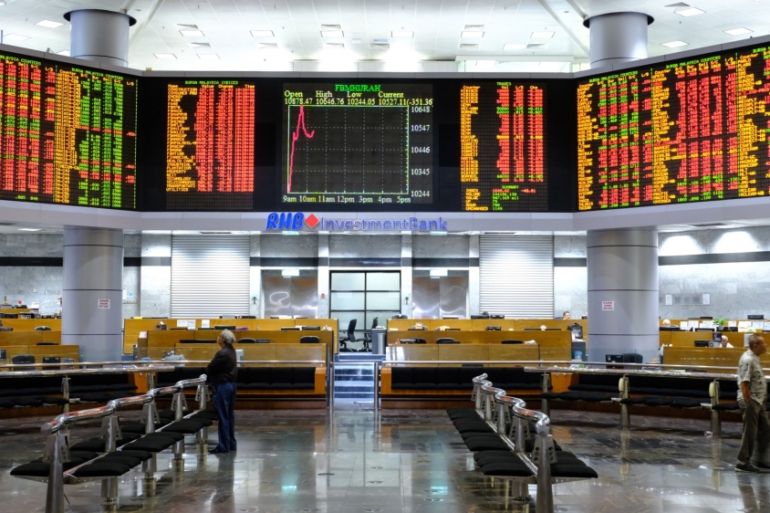Asia shares, oil price suffer fresh spill as virus damage deepens
US President Donald Trump extends social restrictions to end-April as top US health official issues grim warning.

Asian shares slid on Monday and oil prices took another tumble as fears mounted that the global shutdown to curb the spread of the coronavirus could last for months, doing untold harm to economies.
“We continue to mark down [first-half 2020] global [gross domestic product] forecasts as our assessment of both the global pandemic’s reach and the damage related to necessary containment policies has increased,” said JPMorgan economist Bruce Kasman.
Keep reading
list of 3 itemsIMF, World Bank urge debt relief for poor nations battling virus
Kenyans brace for tough times as economic shock looms
They now predict the world’s economy could shrink at a 10.5 percent annualised rate in the first half of the year.
There was much uncertainty about whether funds would have to buy or sell for month- and quarter-end to meet their benchmarks, many of which would have been thrown out of whack by the wild market swings seen over March.
E-Mini futures for the S&P 500 skidded 1.2 percent right from the bell, predicting a likely fall in US markets when they open later on Monday and Japan’s Nikkei 225 index was down 3.2 percent.
MSCI’s broadest index of Asia-Pacific shares outside Japan eased 0.2 percent, while South Korea shed 2.7 percent.
Central banks have mounted an all-out effort to bolster economic activity with interest rate cuts and significant asset-buying campaigns – known as quantitative easing – which has at least eased liquidity strains in markets.
Canada’s central bank on Friday surprised many with an emergency rate cut to 0.25 percent and a programme of quantitative easing, while New Zealand policymakers on Monday launched a loan programme for businesses to meet liquidity needs.
Rodrigo Catril, a senior FX strategist at NAB said the main question for markets was whether all the stimulus would be enough to help the global economy withstand the shock.
“To answer this question, one needs to know the magnitude of the containment measures and for how long they will be implemented,” he added. “This is the big unknown and it suggests markets are likely to remain volatile until this uncertainty is resolved.”
It was not encouraging, then, that British authorities were warning lockdown measures could last months.
While President Donald Trump had talked about reopening the US economy for Easter, on Sunday he extended guidelines for social restrictions to April 30.
Meanwhile, Anthony Fauci, director of the National Institute of Allergy and Infectious Diseases, estimated in an interview with the CNN broadcaster that the pandemic could cause between 100,000 and 200,000 deaths in the US.
Japan on Monday expanded its entry ban to include citizens travelling from the United States, China, South Korea and most of Europe.
Dollar not done yet
The US Federal Reserve has been trying to pump more dollars into markets, dragging the currency off recent highs.
Indeed, the dollar suffered its biggest weekly decline in more than 10 years last week.
Against the yen, the dollar was pinned at 107.44, well off the recent high at 111.71. The euro was firm at $1.1126 after rallying more than 4 percent last week.
“Ultimately, we expect the USD will soon reassert itself as one of the strongest currencies,” argued analysts at CBA, noting the dollar’s role as the world’s reserve currency made it a countercyclical hedge for investors.
“This means the dollar can rise because of the deteriorating global economic outlook, irrespective of the high likelihood the US is also in recession.”
For now, the dollar’s retreat provided a fillip for gold, which was up 0.3 percent on Monday at $1,622.50 an ounce.
But it has been little help for oil as Saudi Arabia and Russia show no signs of backing down in their price war.
Brent crude futures lost $1.45 to $23.48 per barrel, while US crude fell 91 cents to $20.60, their lowest levels in about 17 years.